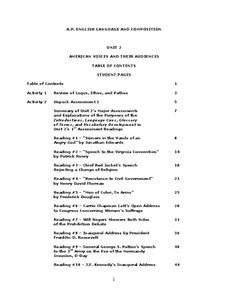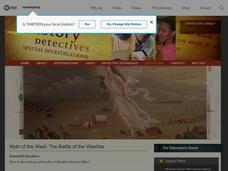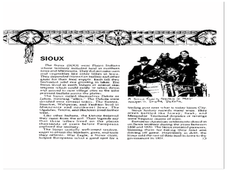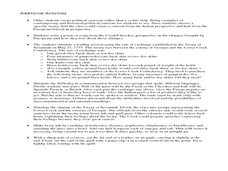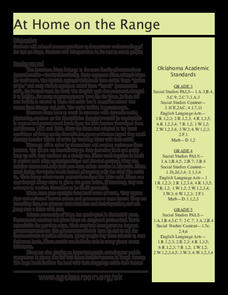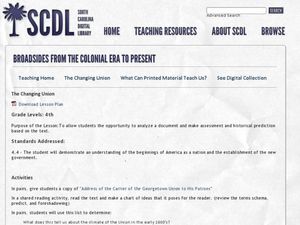National Endowment for the Humanities
The House Un-American Activities Committee
Was the House Un-American Activities Committee justified in investigating subversive influences in the entertainment industry? Part two of the three-part series of lessons that examine the anti-communism movement after World War II,...
Curated OER
American Revolution and Constitution Take-Home Assessment
In this early American history instructional activity, students draw diagrams of that feature the responsibilities of each of the 3 branches of the federal government and then create their own original visuals that highlight the...
Curated OER
Jacksonian America and the Indian Removal Act of 1830
Students utilize primary sources to explore the national climate concerning Native American Indians during the Andrew Jackson administration. They are presented with opinions for and against the Indian Removial Act of 1830 as they...
National Endowment for the Humanities
Lesson 2: The United States, France, and the Problem of Neutrality, 1796–1801
While the French Revolution could be considered inspired by the American Revolution, it created thorny problems for the new United States. Should the United States get involved and be drawn into a European drama? Was the US strong...
Northshore School District
American Voices and Their Audiences
Those new to teaching an AP level language and composition prep course and seasoned veterans will find much to treasure in a unit that is designed to help young language scholars develop the skills they need to analyze the language...
PBS
Evolution of the Presidency: Theodore Roosevelt to Franklin D. Roosevelt
How much power should a president be allowed to exert? Theodore Roosevelt and Franklin D. Roosevelt exercised their power according to their interpretations of the United States Constitution, and these interpretations affected the...
PBS
Myth of the West: The Battle of the Washita
Go West, young man! Scholars use PBS video clips, slide shows, and interactive materials to create a picture of Manifest Destiny in the American West. Using a variety of primary and secondary sources, young historians learn about the...
Curated OER
People for the Land: Native Americans in Iowa
Students identify Iowa's American Indian cultures and complete a research project for the topic. In this Iowa's American Indian lesson, students research read the background information about tribes in Iowa and complete a research...
Curated OER
Eighteenth-Century Slave Codes
Students explore slavery by reviewing the written laws intended to keep African Americans subservient. For this U.S. slavery lesson, students analyze a time-line of the history of African Americans. Students discuss the patterns of the...
National Endowment for the Humanities
Slavery and the American Founding: The "Inconsistency Not to Be Excused"
High schoolers examine slavery in the revolutionary and colonial eras of the United States. In this slavery lesson, students investigate the presence of slavery in early America, the language of the Constitution, and the intent of the...
Curated OER
Native Lands: Indians in Georgia-Shifting Ground Political Cartoon-Introduction
Students explore the relationship between the Creek, Cherokee, and European/American cultures prior to the American Revolution. Students do Internet research to identify and explain changes in these cultures, then create six panel...
Curated OER
Seals: From the National To the Local
Third graders investigate official government symbols by completing a scavenger hunt. In this U.S. Government activity, 3rd graders participate in a scavenger hunt in which they locate seals or logos in their community. Students...
Curated OER
Native Lands: Indians in Georgia
Students investigate the Native Americans of the Muscogee Creek and their use of the land. In this U.S. history lesson, students investigate the importance of the deer for the Muscogee Creek peoples' way of life and the many uses they...
Curated OER
Unit 2: Post-Revolution: The Critical Period 1781-1878
The post-Revolutionary Period of 1781-1787, also known as the Critical Period, is the focus of a series of lessons that prompt class members to examine primary source documents that reveal the instability of the period of the Articles of...
Roy Rosenzweig Center for History and New Media
Founding Documents
Teach the class about the predecessor to Declaration of Independence—the Virginia Declaration of Rights. Using the foundational documents, scholars examine the two writings to consider how they are similar and how they are different. A...
Curated OER
What is Suffrage? Understanding the Right to Vote
Students discover one of the restrictions forced on women of the early 1900s. In this civil rights lesson, students investigate suffrage and why women were not allowed to vote in the early twentieth century. Students create a mock...
Curated OER
At Home On The Range
Students explore the history and domestication of the Bovidae family and their importance to our prairie ecosystem. Using a map of the United States, students located the American Great Plains. They complete worksheets and discuss...
Curated OER
Discovering the Oregon Trail
Students explore U.S. history by researching the Oregon Trail. In this American exploration lesson, students read the story On the Shore of the River and define the exact path early settlers took to find the state of Oregon. Students...
Curated OER
The Roots of Prohibition: Examining the Effort to Prohibit Alcohol in America
Five segements from Ken Burns' documentary series Prohibition, easily accessed on the PBS website, are at the center of a terrific short unit on the roots of America's ambivalent relationship with alcohol. Engage your secondary class...
Curated OER
The Changing Union
Fourth graders analyze a document and make assessment and historical prediction based on the text. In this establishment of American government lesson, 4th graders analyze a poem and discuss the climate of the Union in the early 1800's....
Alabama Learning Exchange
Learning About Colonial Life
High schoolers use predictions to explore the lifestyle of American colonists. They draw conclusions about the culture of colonial America based on items used in daily life.
Curated OER
Criminal or Hero
Young scholars investigate slavery in America circa the American Revolution. They will examine point- of view and perspective as they research a variety of informational resources. While this is designed to be used with the PBS video...
K12 Reader
The Attack on Pearl Harbor
After reading a short passage about Japan's involvement in World War II and why the Japanese attacked Pearl Harbor, readers are asked to analyze how the attack effected the attitudes of Americans who previously had not wanted to go to war.
Alabama Learning Exchange
President's Day for Special Education/Early Elementary
Students investigate how both Abraham Lincoln and George Washington displayed the trait of honesty. They listen to read alouds of class books and poems that address both the lives of these men and the trait of honesty. They use a graphic...






